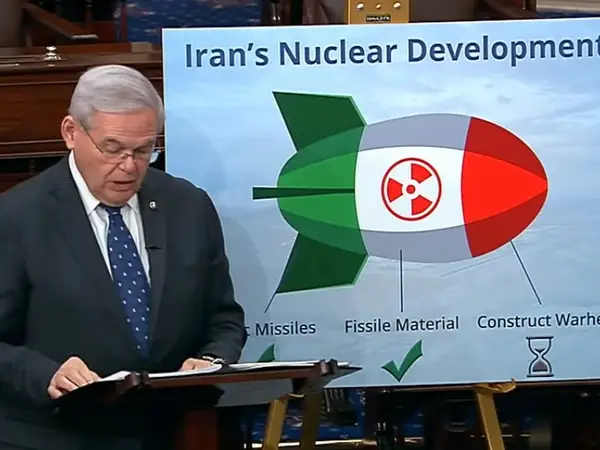Several US senators told Iran International that Washington should stop talks with the Islamic Republic over revival of the 2015 nuclear deal, especially considering the ongoing popular protests.
Democratic Senator from New Jersey Bob Menendez, who is the chairman Senate Foreign Relations Committee, told our correspondent that the United States should get ready for the fall of the regime in Iran, noting that the last time Iranians revolted against the government, the US did not have any plans.
“I hope we'd be ready, and we'd have our contingencies and engagement, because we lost in the Green Revolution, we should be able to be ready for it now,” he said.
Utah’s Republican Senator Mitt Romney also voiced his support for the popular uprising of the Iranians -- triggered by the death of 22-year-old woman Mahsa Amini in the hands of hijab police – saying that currently it is not a good idea to be negotiating with Iran on a nuclear deal. “Iran is a bad actor and providing more resources to them and relieving sanctions would be a big mistake.”
Echoing similar sentiments, Alabama’s Republican Senator Tommy Tuberville warned against further nuclear negotiations with Iran while the country is in turmoil. “We don't need to get back to that dialog with Iran. They're obviously having problems over there right now. They need to work out their own problems.”
Calling the Islamic Republic’s authorities “dictators,” he said he is not surprised that “the Iranian regime is clamping down on Iranian protesters.”
Republican Senator from North Carolina Thom Tillis described the Biden administration's plan to go back to negotiating table with Iran as “ill-advised,” underlining that the Islamic Republic is a “state sponsor of terror” that every year “invests hundreds of millions of dollars” to destabilize the Middle East.
He added that it is beyond his comprehension that the Biden administration “thinks it'd be wise to do anything that would bolster that leadership versus stand with the Iranian people who want change.”
Pennsylvania's Senator Pat Toomey, also a Republican, called on the Biden administration to voice very strong, clear support for the protesters, highlighting that they are “only protesting for basic human rights, and they deserve those rights.”
He told our Congressional reporter Arash Alaei that “I don't think we can get a workable nuclear deal with this regime.”
Toomey said he does not have the expertise to make a prediction about the collapse of the regime, adding that “Sadly we know authoritarian regimes are able to retain power for a long period of time even when they're not popular.”
Republican Senator Mike Rounds from South Dakota also urged the administration against negotiating with Iran right now, emphasizing that the Islamic Republic is “a terrorist state.”
He touched upon the suffering of Iranians under the regime, saying, “Once again they're using some of those same tactics against their own people.”
Stressing that the “terrorist” regime in power in Iran is different from the Iranians who are good people themselves, he said that “we're having a difficult time in trying to find common ground with them (the regime). And that hurts our ability to have a good relationship with the people of Iran.”
Chris Van Hollen, Maryland's Democratic senator, also denounced the Islamic Republic's “vicious crackdown” on protesters as a “gross violation of women's rights and human rights,” expressing satisfaction that Washington slapped sanctions on hijab police and some security officials involved in the crackdown on peaceful protesters.
The Treasury Department said last week that its Office of Foreign Assets Control (OFAC) isdesignating Iran’s Morality Police “for abuse and violence against Iranian women and the violation of the rights of peaceful Iranian protestors.”
However, he said repression is already brutal in Iran without a nuclear deal, “So the idea that entering an agreement would cause the Iranian regime to be more brutal in its crackdown doesn't make sense to me.” “A nuclear armed Iran is worse for the US and our allies than a non-nuclear Iran,” he said, implying support for revival of the Joint Comprehensive Plan of Action (JCPOA).
